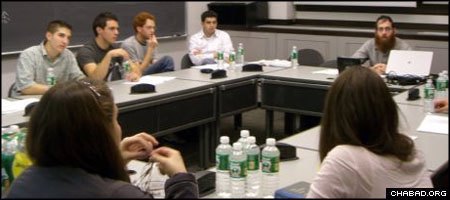In an event hailed by participants as groundbreaking, undergraduate students, noted professors and distinguished Torah scholars from around the world will come together for the first Students-and-Scholars Academic Symposium.
Hosted by Chabad on Campus at Princeton University, the April 26 conference of the Sinai Scholars Society – which each semester, sees up to 20 students on each of 45 college campuses study Torah and contemporary issues with their local Chabad-Lubavitch emissaries – will feature the discussion and debate that has become central to the Sinai Scholars program. Eight students will present originally-researched papers examining the application of Jewish ethics to a postmodern world.
“We’re very excited about all of the effort the students put into their papers,” says Rabbi Yitzchok Dubov, director of the Sinai Scholars Society. “We’re bringing these students together with great academics and rabbinic figures to discuss all sorts of Jewish topics amidst the prestigious and breathtaking backdrop of Princeton University.”
Composed of ranking experts in the field of Jewish studies, the lineup includes Rabbi Immanuel Schochet, professor emeritus of philosophy at Toronto’s Humber College; Lewis Glinert, professor of Asian and Middle Eastern languages at literatures at Dartmouth College; Lawrence Schiffman, chairman of the Skirball Department of Hebrew and Judaic Studies at New York University; and Naftali Loewenthal, professor of Hebrew and Jewish studies at University College of London.
“It’s always great to meet other students that are interested in such questions of great importance. I look forward to the conversations we’re all going to have,” says Daniel Slate, a senior at Stanford University majoring in philosophy.
Slate will be presenting his paper, “Sinai and the Principles of Highest Purpose,” which discusses how the Ten Commandments can only be fully understood within the context of the Book of Genesis and its description of how human beings were created in the image of G‑d.
The Sinai Scholars Society is a project of the Rohr Jewish Learning Institute and the Chabad on Campus International Foundation. The society is underwritten by the Rohr Family Foundation and supported by several corporate sponsors.
The conference, which is the culmination of the society’s semester-long courses, was designed with rigorous academic standards in mind. Organizers stress that it will feature in-depth intellectual analytic study of original sources of Torah and Chasidic texts in a way that is appealing and understandable to modern critical minds.

What makes this conference unique, though, is its student involvement, say participants. Students not only will present their own research, but will also debate the panel of academics that will provide feedback on their work. Students will return to their campuses to edit their papers for inclusion in a bound volume of the conference’s proceedings.
“I have been so excited about this for the past month or more, [about] getting to meet and talk with different Jewish scholars, and getting the essay published in the publication,” says Shifra Blumenthal, a University of Colorado-Boulder student who will be presenting her paper, “What and Where is G‑d, and What Does it Have to Do With Me?”
Blumenthal adds that she’s looking forward to “spending a few days being able to really live and think and eat and do everything Jewish.”
Jennifer Chevinsky, a sophomore at the University of Connecticut who is majoring in bioethics in cross-cultural perspectives, is also excited about participating in the conference. Her paper, “End of Life Issues: Are Rabbinic and Biblical Standards Relevant?” discusses medical ethics and compares the traditional Jewish perspective with accepted American standards.
“My topic is something that I’m really interested in,” she says. “This has been a great learning experience for me, which is something that I don’t always get in college, where people don’t always know that much about Judaism.”
Rabbi Eitan Webb, director of Chabad on Campus at Princeton, views the conference as an opportunity to concretize the students’ achievements in a way that will enable them to return to their campuses more versed in Torah teachings.
“This conference has enabled the students to do their own research and learn even more,” he says. “They have been able to connect with their heritage in a meaningful and thought-provoking way.”
For a schedule of the Students-and-Scholars Academic Symposium, click here.




Start a Discussion